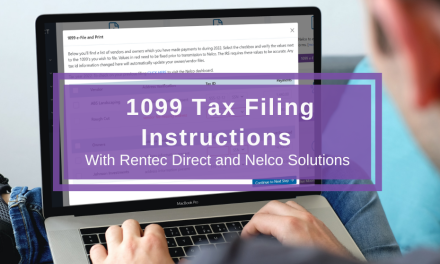

Property managers are responsible for approving and rejecting rental applicants.
As long as the reasons for denial are legitimate and meet F ederal Fair Housing Guidelines , you have the right to approve the most qualified rental applicant to become your next tenant (and say “no” to the rest).
To understand just how often rental managers have to deny a rental applicant, Nathan Miller, president of Rentec Direct, looked at data from more than 13,000 property managers and landlords who use Rentec Direct’s property management software:
“We reviewed some statistics from 5236 rental applications received during the first two months of 2017. Of those applications, 56% of the units we rented after receiving just one application,” says Miller. “The remaining units received between 2 and 63 applicants per unit. The average overall was 3.54 applicants per unit to find and place a tenant .”
If you are one of the managers with 63 applicants for a single unit, there are going to quite a few people that need to hear why they were rejected.
To save yourself from any discrimination claims, you need to be able to tell a rental applicant exactly why they didn’t get approved for the property.
If you simply tell a rental applicant it’s not going to work out but you give them zero reasons, they can file a discrimination claim, even if you based your decision on legal reasons. If they happen to belong to a protected class, you could be in some legal trouble. (It’s called disparate-impact and you can learn more about it here: Are you breaking Fair Housing Laws unintentionally? )
A housing provider can find a qualified renter by reviewing an applicant’s credit report and criminal record, verifying employment and income, checking references, and speaking to your past landlords to find out if they were a lease-breaking tenant.
You are not allowed to deny any rental applicants due to their race, religion, sex, familial status, disability, color, or national origin, under the Fair Housing Act.
You can deny a rental applicant as long as the landlord can prove that every applicant was screened by the same standards and the basis for rejection was due to an applicant’s potential inability to pay rent or if he is seen as dangerous to the property or neighborhood.
However, the way you tell a renter they are “not approved” needs to handled legally – especially if you deny a renter due to their credit score or information on their credit report or another public record.
If an applicant is rejected based on information found on a credit report, the landlord must provide an Adverse Action Notice to the applicant.
An Adverse Action Notice tells the renter that he was denied due to information found on a consumer credit report, and gives contact information for the credit reporting agency used so the applicant can access the report too.
Providing an applicant with an Adverse Action Notices is a federal requirement created by the Federal Fair Credit Reporting Act .
If a renter contacts you saying that the information on their credit report is inaccurate, you should advise the renter to refer back to the Adverse Action Notice you provided and speak directly with the credit reporting agency to figure out how to make adjustments to their credit report.
After issuing an adverse action letter, if any rental applicant’s try and dispute the reasoning with you, consider this suggestion from Heather Peake, a former manager of 80+ properties in California, “I used to point [applicants] to the adverse action letter for instructions on who to contact to repair/remove information and then let them know that after they have proof of correction they were welcome to apply to any units we had available at that time. If they asked about the unit they were denied for I would indicate that we could not hold the unit on their behalf.”
Starpoint provides a free Adverse Action Notice for housing providers: Free Denial Letter
If you are a Rentec Direct Client you can use this template from Starpoint:
Here is the Starpoint template If you are declining the application based on information obtained within their TransUnion credit report.
Landlords and property managers are only allowed to use a criminal record to deny a rental applicant if the record shows dangerous criminal convictions that would put the property, other tenants, or the neighborhood at risk.
You are not allowed to use arrest records to determine a rental applicant’s qualifications.
If you deny a rental applicant due to information found on a public record (like a criminal background report or eviction search) you need to provide the applicant with a denial letter and instructions on how they can obtain a copy of the report. You do not need to provide a copy of the report, just tell the applicant which agency you used to access the report and who to contact to get a copy.
Here is the CIC Template If you are declining the application based on information obtained within their nationwide criminal search (report code: CRIM), or nationwide eviction search (report code: EVICTION).
Kathryn Szymanski from the Client Success Team at Rentec Direct and a former property manager in Oregon, says, “Our best practices when I was in PM was to mail [an adverse action] letter no matter whether whole/part/no credit was reason for denial and then we listed all of our companies used for decision in the letter.”
The Landlord Protection Agency, recommends creating a generic rejection letter with a checklist of potential legal reasons an applicant was denied. A manager or landlord simply needs to check which reason applied to the applicant and return to them.
Housing providers are advised to approve rental applicants on a first come, first serve basis. First come meaning, the first QUALIFIED applicant (not the first applicant). Undoubtedly, this means you will have to deny a qualified applicant simply because some else was approved before them.
If you are denying a rental applicant because a property is no longer available, make sure to communicate this as the reason. You can let them know, they were approved for the property, but that another applicant was approved before them. You can also give them instructions on how to apply for another property you manage.
Property managers and landlords can follow legal requirements and protect themselves from discrimination claims by following these steps for denying a rental applicant the right way.
Kaycee Miller manages marketing and media relations for Rentec Direct, bringing a unique perspective to the world of property management and proudly shares industry news, products, and trends within the community.


November 2, 2016


February 23, 2018
jokes apart and aplogies for bad use of words..but should there not be a transparency maintained in the whole process..Why should he property managers / landlord have to play games as suggested in this article.This just shows property managers are up to manipulate the who law.. Reply
Harris on August 21, 2017 at 4:24 pmwhat if the property managers just keep collecting application fees from multiple prospects and just inform the prospects per the guidance in this blog..what is the protection for prospects against this fraud?? Reply
vivi on July 23, 2018 at 7:32 amYes I would like to know as right now I am going through this, they are collecting $25.00 per adult on the application in an effort to raise more money before deciding to rent, and they had my application for a month now, telling me they are still considering applications, but I am the top candidate. Reply
Kaycee Miller on July 23, 2018 at 11:16 amSomething I hadn’t considered, but perhaps renters are getting denied due to high income because a housing provider does not see the applicant as a long term renter? If a renter makes significantly more than the rental is priced out, a housing provider might assume the applicant will move to a higher priced rental or purchase a house in the near future, compared to an applicant that is closer to the stated income requirements. I am not sure this is the case, just a thought I had. I am not sure if it is legal either, as it seems like an subjective qualification technique. However, income amount is not a protected class. I would speak with a local housing authority for more information about tenant screening in your area. Reply
Kaycee Wegener on August 23, 2017 at 10:03 amA good property manager will be very transparent his screening criteria and the minimum qualification required to get approved (like income and credit score). Additionally, it’s standard practice to accept application fees in the order they are received and approved the first qualified tenant. The landlord/manager will then return application fees for anyone he did not screen after approving the first qualified tenant. Sometimes there are bad landlords that don’t follow the rules and break the law. Just like there are some bad renters who lie about credit scores or eviction history. If you feel like a landlord has unfairly denied your rental application or mistreated you as a tenant, all renters are encouraged to report them to their local housing authority and speak with an attorney if legal action is required. Reply
Aoi on April 18, 2019 at 11:01 pmYou are talking about “application fees” for those that are “not screened,” right? I have had a case that the property management did not screen us at all (no record shown in our credit report), but they never returned the fees. So I understand how that feels like. However, what about the credit check fees? Landlord runs the credit check and it shows multiple things that is not desirable and do not meet the criteria, but the landlord sent the applicant of the pre-qualification checklist and warned that the fee is non-refundable (because it costs landlord to run these checks). I do not think these should be refundable. If anything, the landlord just wasted time on an applicant who did not meet criteria at all just from the pre-qualification checklist that was sent to the applicant before sending the application. If the landlord has to return that fee for every applicant who do not qualify, the law seems skewed to say the landlord has to go in first-come, first-serve basis knowing the next one in line may not qualify (from other sources) but still have to give them a chance to fill out application… Then they would fill it out completely disregarding the pre-qualification checklist sent to them, then they demand the money back that was already spent on the credit check. Reply
Harris on August 23, 2017 at 11:16 pmare the property managers obliged to disclose who the landlord is. She kept saying that landlord she has taken approval from landlord and requested my partner also to fill another application form so that the rental can be formalized. After a wait of almost 1 week, suddenly one day on being repeatedly followed up, she turned her stand and said that I could submit your application today morning together with another application. It’s now upto landlord who selects either you or other applicant ( same story as suggested in this blog)…what proof should I expect to know my application has been fairly processed? Reply
Kaycee Wegener on August 24, 2017 at 2:14 pmWhether or not the property manager has to disclose who owns the property (landlord) is dependent on your state’s law. But the property manager might not have to disclose that information to applicants, only to tenants after they have signed a lease. You could do your own research and look up public records to see who owns the house, but not sure what benefit that would do. The owner has hired a property manager that you should be working with directly. If you are denied based on information found on your credit report or a public record, like an eviction report or criminal background report, the property manager should send you a formal Adverse Action Letter. If the another applicant gets approved, it could simply be because they were “more qualified” as in had a higher income or better references. Some state’s require a first come, first serve policy, but not everywhere does. I also wanted to note, that it is standard practice for all adults who would be living in the property submit a rental application and go through the approval process. So even if you meet the qualifications on your own, but your partner does not, you might be collectively denied from renting the property. If you feel like a landlord has unfairly denied your rental application or mistreated you as a tenant, all renters are encouraged to report them to their local housing authority and speak with an attorney if legal advise or action is required. Reply
Matt on February 26, 2018 at 4:50 pmI have a non violent arrest but have not been convicted and the apartments I’m applying for said transunion denied my application because of the arrest what can I do about this? I called transunion and all they did was put in a dispute that could take up to 30 days for a response. This is urgent for I am soppost to be out of my current home in less than a month. Contact me at matthew.kelly9@yahoo.com asap please and thank you. Reply
Kaycee Wegener on February 27, 2018 at 11:30 amArrest records are not a legitimate reason to deny a rental applicant. Even if Transunion is reporting the arrest, an apartment or property manager cannot use arrest records for tenant screening. This is a nationwide HUD policy. Here is more information: https://www.applyconnect.com/blog/hud-rules-against-using-arrests-records/ You should contact your local housing authority to report this discriminatory behavior. Reply
Alex T. on May 25, 2018 at 5:24 pmHelp please: Can a property manager not accept your application and application fee? Can he/she tell that he/she won’t process your application, not to waste your time turning in an application because she won’t process it? I was under the impression that they have to take and process ones application before approving or denying it. Reply
Kaycee Wegener on May 30, 2018 at 2:30 pmSome property managers will complete a “pre-screening process” before processing a rental application. This might include asking about income or a prospective move-in date, or if you have pets. If you don’t meet the pre-screening qualifications, they might not move forward with processing your actual rental application. It will cost the property manager and you money to process a rental application, which is why this happens. It is illegal for a property manager or landlord to refuse to process a rental application or deny a rental applicant based on information related to protected classes under Federal Fair Housing Laws. Reply
Lori L. on July 16, 2018 at 11:32 amMy family and i applied for an apartment and paid the application fee. While in the property managers office i was gathering all the requested information, my income along with verification my daughter receives SSI. The property manager requested that I apply for HUD voucher, I advised her that i did not need it and I would be denied. She insisted that we may qualify because the income for family of 4 went up. so i filled out the application anyway. The property manager allowed us to view apartments and even assigned us an apartment number with a move in date. She showed me receipts from where new appliances were purchased for the assigned apartment and said that we would be the first to use them. While waiting on a response to our application i reached out to the property manager for an update and would get responses as though she was out sick and so forth. During this time, she was discussing my application with other tenants. I know this because one of the tenants was a family member of mine and another was a family member of hers. After 33 days since we applied i received an email stating that she sent something in the mail and we are over income. I have checked the mail box everyday without anything from her in it. my family and i was just led on by this property manager and while she was looking at our financials she knew that we would not be approved. and no where on the application did it say anything about certain income limits or did she say so when I was applying. I contacted the property owners main office and it seems like they do not care and i filed a complaint with the local housing authority along with reaching out to lawyers because i feel as though our information and confidentiality was breached along with being falsely presented information. Reply
Kaycee Miller on July 16, 2018 at 2:53 pmThis is the second time I have heard about an applicant getting denied because they have too much income. It’s something I am not familiar with but plan on researching more. It’s a shame the manager didn’t give you any information about an income limit. Good job taking the steps to protect yourself and report the company if you felt mistreated. Keep us posted with what happens. Reply
Brandon R on October 26, 2018 at 4:33 pmI was just approved from a property management company for my application to rent a property and was waiting for the lease to be sent over via email so that I could review it and sign it. They never sent it over and then told us that they received another application and approved it and that they were going to rent it out to the other party. We were assured that we would have the first right of refusal and were never given the chance. Is this legal? Reply
Kaycee Miller on October 29, 2018 at 11:46 amThat sounds pretty sketchy to me. Does your state or local area have any laws about first come, first serve rental applications. Reply
gail t mills on April 23, 2019 at 4:12 pmHow does a landlord handle several qualified applicants, especially if one applicant is preferred over others but not based on their qualifications? Reply
Kaycee Miller on April 26, 2019 at 10:24 amIts best to stick to your written screening criteria. It is also best to stick to a first-come first-serve policy, where you approve the first qualified applicant, not the first applicant that you like the most. Reply
JM on November 17, 2020 at 11:40 amHi Kaycee, Thank you for your article. I understand that landlords cannot deny an application based on family size (for example, 8 ppl vs 2 ppl) out of concern there will be more wear and tear on the home with the former. How about prospective tenant’s bad history at their previous rental – can it grounds for denial? What other factors can the landlord use to deny prospective tenant? Regards,
JM Reply
I wish I could give you a definitive answer. However, grounds for denial such as occupancy limits, criminal history, credit score criteria, etc. vary by location and even by types of housing (ie: mobile home parks, low-income housing, etc.). For example, in Oregon occupancy statute limits are set to 2 persons per bedroom within reason; which the Fair Housing Council suggests means 2 per bedroom plus 1 additional occupant. Example: A landlord could rent a 2 bedroom house to up to 5 persons whereas a 4 bedroom could be occupied by 9 persons. A poor tenant history can be grounds for denial as long as you are not showing partiality. It’s important to set the same criteria for all applicants so as not to engage in discrimination. An added layer of complexity comes into play as some states and municipalities limit the types of questions a landlord may ask applicants and/or inquire from their employer or current/past landlord. In addition to the poor rental history, tenants can be denied for application errors and omissions, missing supporting documents, inaccurate or inconsistent application information (mismatch between application and supporting documents), unverifiable rental history, etc. This article might prove helpful in setting your approval standards: Tenant Screening Red Flags Because grounds for denial are so location and situation-specific and can result in legal hot water if done incorrectly, I would recommend checking with your state regulations and then have your legal counsel review your application standards. Reply
Vickie on May 1, 2023 at 10:48 pmI recently got denied for a apartment due to bad credit,then I asked if I had a co- signer would it help. I was told the co-signer would have to have a strong credit history and job history ,my co-signer said his credit score wasn’t perfect but was over 600. So I pd for a credit check ,then was sent a text by landlord saying she did not receive my money and couldn’t found my paperwork,then her next text said she had my money,and was doing check on co-signer, the last text said it’s just not going to work,sorry she would give me my money back .There was no explanation or reason why,so I had to call her several,several times plus text just for her to tell me that my income and the cosigner income would not p ay the rent. I feel like she didn’t even do a credit check on the co-signer,why would she offer the money back? The credit check money was non refundable. And she acted like the co-signer and I was renting the apartment together. Reply